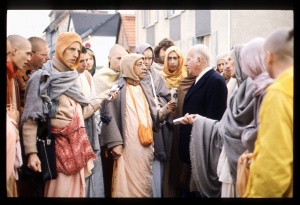CC Adi 4.23: Difference between revisions
m (1 revision(s)) |
No edit summary |
||
| Line 1: | Line 1: | ||
{{ | [[Category:Sri Caitanya-caritamrta - Adi-lila Chapter 04|C023]] | ||
<div style="float:left">'''[[Sri Caitanya-caritamrta|Śrī Caitanya-caritāmṛta]] - [[CC Adi|Ādi-līlā]] - [[CC Adi 4|Chapter 4: The Confidential Reasons for the Appearance of Śrī Caitanya Mahāprabhu]]'''</div> | |||
<div style="float:right">[[File:Go-previous.png|link=CC Adi 4.21-22|Ādi-līlā 4.21-22]] '''[[CC Adi 4.21-22|Ādi-līlā 4.21-22]] - [[CC Adi 4.24|Ādi-līlā 4.24]]''' [[File:Go-next.png|link=CC Adi 4.24|Ādi-līlā 4.24]]</div> | |||
{{CompareVersions|CC|Adi 4.23|CC 1975|CC 1996}} | |||
{{RandomImage}} | |||
==== TEXT 23 ==== | ==== TEXT 23 ==== | ||
<div | <div class="verse"> | ||
mayi bhaktir hi bhūtānām | :mayi bhaktir hi bhūtānām | ||
amṛtatvāya kalpate | :amṛtatvāya kalpate | ||
diṣṭyā yad āsīn mat-sneho | :diṣṭyā yad āsīn mat-sneho | ||
bhavatīnāṁ mad-āpanaḥ | :bhavatīnāṁ mad-āpanaḥ | ||
</div> | </div> | ||
| Line 14: | Line 18: | ||
==== SYNONYMS ==== | ==== SYNONYMS ==== | ||
<div | <div class="synonyms"> | ||
''mayi''—to Me; ''bhaktiḥ''—devotional service; ''hi''—certainly; ''bhūtānām''—of the living beings; ''amṛtatvāya''—the eternal life; ''kalpate''—brings about; ''diṣṭyā''—by good fortune; ''yat''—which; ''āsīt''—was; ''mat''—for Me; ''snehaḥ''—the affection; ''bhavatīnām''—of all of you; ''mat''—of Me; ''āpanaḥ''—the obtaining. | |||
</div> | </div> | ||
| Line 21: | Line 25: | ||
==== TRANSLATION ==== | ==== TRANSLATION ==== | ||
<div | <div class="translation"> | ||
“‘Devotional service rendered to Me by the living beings revives their eternal life. O My dear damsels of Vraja, your affection for Me is your good fortune, for it is the only means by which you have obtained My favor.’ | “‘Devotional service rendered to Me by the living beings revives their eternal life. O My dear damsels of Vraja, your affection for Me is your good fortune, for it is the only means by which you have obtained My favor.’ | ||
</div> | </div> | ||
| Line 28: | Line 32: | ||
==== PURPORT ==== | ==== PURPORT ==== | ||
<div | <div class="purport"> | ||
Pure devotional service is represented in the activities of the residents of Vrajabhūmi (Vṛndāvana). During a solar eclipse, the Lord came from Dvārakā and met the inhabitants of Vṛndāvana at Samanta-pañcaka. The meeting was intensely painful for the damsels of Vrajabhūmi because Lord Kṛṣṇa had apparently left them to reside at Dvārakā. But the Lord obligingly acknowledged the pure devotional service of the damsels of Vraja by speaking this verse ([[SB 10.82.44]]). | Pure devotional service is represented in the activities of the residents of ''Vrajabhūmi'' (Vṛndāvana). During a solar eclipse, the Lord came from Dvārakā and met the inhabitants of Vṛndāvana at Samanta-pañcaka. The meeting was intensely painful for the damsels of ''Vrajabhūmi'' because Lord Kṛṣṇa had apparently left them to reside at Dvārakā. But the Lord obligingly acknowledged the pure devotional service of the damsels of ''Vraja'' by speaking this verse ([[SB 10.82.44]]). | ||
</div> | </div> | ||
__NOTOC__ | |||
<div style="float:right; clear:both;">[[File:Go-previous.png|link=CC Adi 4.21-22|Ādi-līlā 4.21-22]] '''[[CC Adi 4.21-22|Ādi-līlā 4.21-22]] - [[CC Adi 4.24|Ādi-līlā 4.24]]''' [[File:Go-next.png|link=CC Adi 4.24|Ādi-līlā 4.24]]</div> | |||
__NOTOC__ | |||
__NOEDITSECTION__ | |||
Revision as of 14:11, 18 July 2021

A.C. Bhaktivedanta Swami Prabhupada
TEXT 23
- mayi bhaktir hi bhūtānām
- amṛtatvāya kalpate
- diṣṭyā yad āsīn mat-sneho
- bhavatīnāṁ mad-āpanaḥ
SYNONYMS
mayi—to Me; bhaktiḥ—devotional service; hi—certainly; bhūtānām—of the living beings; amṛtatvāya—the eternal life; kalpate—brings about; diṣṭyā—by good fortune; yat—which; āsīt—was; mat—for Me; snehaḥ—the affection; bhavatīnām—of all of you; mat—of Me; āpanaḥ—the obtaining.
TRANSLATION
“‘Devotional service rendered to Me by the living beings revives their eternal life. O My dear damsels of Vraja, your affection for Me is your good fortune, for it is the only means by which you have obtained My favor.’
PURPORT
Pure devotional service is represented in the activities of the residents of Vrajabhūmi (Vṛndāvana). During a solar eclipse, the Lord came from Dvārakā and met the inhabitants of Vṛndāvana at Samanta-pañcaka. The meeting was intensely painful for the damsels of Vrajabhūmi because Lord Kṛṣṇa had apparently left them to reside at Dvārakā. But the Lord obligingly acknowledged the pure devotional service of the damsels of Vraja by speaking this verse (SB 10.82.44).